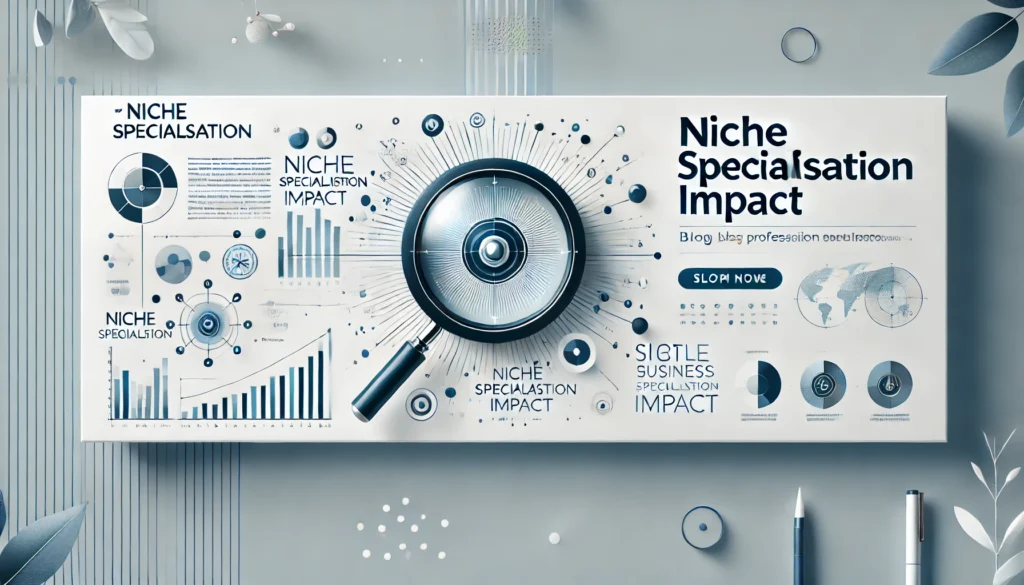In today’s fast-paced world, businesses and individuals face one common challenge: standing out in a crowded market. The answer lies in an age-old principle that has become more relevant than ever—niche specialisation. But what exactly does this mean? How can it influence your career, business, or even your life goals? This post dives deep into the Niche Specialisation Impact, breaking it down into simple terms so anyone can understand its power and apply it effectively.

Table of Contents
What is Niche Specialisation?
Before we explore the impact, let’s first understand what niche specialisation means. A niche is a focused, specific segment of a larger market. Specialisation refers to becoming highly skilled or knowledgeable in that particular segment. Together, niche specialisation means targeting a narrow audience and excelling in meeting their unique needs.
For example, a general digital marketer targets all businesses, while a specialised SEO expert for e-commerce stores caters to a specific audience with specific needs. This specialisation creates unique value and builds trust with clients or customers.
Why Does Niche Specialisation Matter?
The Niche Specialisation Impact is profound because it allows you to focus on quality over quantity. By catering to a specific group, you can:
- Build Authority: Becoming an expert in one area makes people trust you.
- Attract the Right Audience: Instead of trying to please everyone, you reach people who genuinely need what you offer.
- Reduce Competition: Operating in a narrow field means fewer competitors and more opportunities.
- Command Higher Prices: Specialised services or products are often valued more, allowing you to charge premium rates.
Niche Specialisation Impact on Businesses
In the business world, niche specialisation can transform how companies operate and grow. Here’s a breakdown of its impact:
1. Enhanced Branding
When a business specialises, it becomes easier to build a brand identity. For example, a bakery that only makes gluten-free desserts quickly becomes known as the place for gluten-free treats. Customers immediately associate your brand with quality and expertise in that area.
2. Stronger Customer Loyalty
People prefer working with experts who truly understand their needs. When you focus on a niche, you build a loyal customer base that returns to you because they know you’re the best in the field.
3. Efficient Marketing
Marketing to a specific audience is more effective than casting a wide net. Niche businesses can use targeted ads, relevant content, and direct communication to reach their audience, saving time and money.
4. Innovation and Growth
Specialisation often leads to innovation. Understanding your niche deeply allows you to improve your products, create new solutions, and grow sustainably.
Niche Specialisation Impact on Careers
For individuals, the Niche Specialisation Impact can determine your success in a competitive job market. Here’s how it helps:
1. Increased Job Opportunities
Employers value specialised skills. If you’re known for being an expert in a particular field, companies will actively seek your expertise.
2. Career Growth
Specialisation opens doors to leadership roles. Experts are often seen as industry leaders and are more likely to get promotions or higher-paying roles.
3. Personal Fulfillment
Specialising in what you love ensures that you find work meaningful and rewarding. You’re not just doing a job; you’re following a passion.
Challenges of Niche Specialisation
While the Niche Specialisation Impact is overwhelmingly positive, it’s not without challenges. Some of the potential drawbacks include:
1. Initial Narrow Focus
Starting with a niche can feel restrictive. It may take time to build a client base or audience because your focus is narrow.
2. Risk of Market Saturation
If too many people enter the same niche, it can become saturated. Staying innovative and adaptable is key to overcoming this issue.
3. Dependency on a Single Audience
Specialising in a specific niche means you depend heavily on one audience. If their preferences change, your business or career could face challenges.
How to Choose the Right Niche
Selecting the right niche is crucial to maximising the Niche Specialisation Impact. Here are some steps to help you choose:
1. Identify Your Passion and Skills
Focus on areas you enjoy and are good at. When your work aligns with your interests, it becomes easier to stay motivated.
2. Understand Market Demand
Research what people need and where there’s a gap in the market. This ensures your niche is relevant and profitable.
3. Analyze Your Competition
Study your competitors in the niche. If the field is overcrowded, think about how you can differentiate yourself.
4. Start Small and Expand
Begin with a very narrow focus. As you gain authority and experience, you can expand your services or products to related areas.
Examples of Niche Specialisation Impact
1. Tech Industry
Companies like Salesforce have thrived by specialising in customer relationship management (CRM) software. Instead of being a general software company, they dominate their niche.
2. Healthcare
Doctors who specialise in rare conditions or advanced surgeries often attract more patients and are highly respected in their fields.
3. Freelancing
Writers who focus on a specific industry, such as fintech, are often preferred over generalists.
Tips for Maximising the Niche Specialisation Impact
- Stay Updated: Keep learning and improving your skills to maintain your expertise.
- Build a Community: Engage with your niche audience through blogs, forums, or social media.
- Be Consistent: Deliver consistent quality to build trust and a strong reputation.
- Seek Feedback: Regularly ask your audience or clients for feedback to refine your offerings.
Conclusion
The Niche Specialisation Impact is undeniable. Whether you’re a business owner, a professional, or someone just starting their journey, focusing on a niche can lead to long-term success. By targeting a specific audience, building expertise, and delivering consistent value, you stand out in a competitive world.
While challenges exist, the rewards far outweigh the risks. Take the first step toward niche specialisation today, and unlock new opportunities for growth, innovation, and success.
FAQs
What is niche specialisation?
Niche specialisation refers to focusing on a specific segment of the market and excelling in it.
How does niche specialisation impact businesses?
It helps businesses build strong brands, attract loyal customers, and reduce competition while increasing profitability.
Can niche specialisation benefit my career?
Yes, it makes you more desirable to employers, opens doors to better opportunities, and ensures career growth.
What are the risks of niche specialisation?
Risks include market saturation, dependency on a single audience, and feeling restricted initially.



